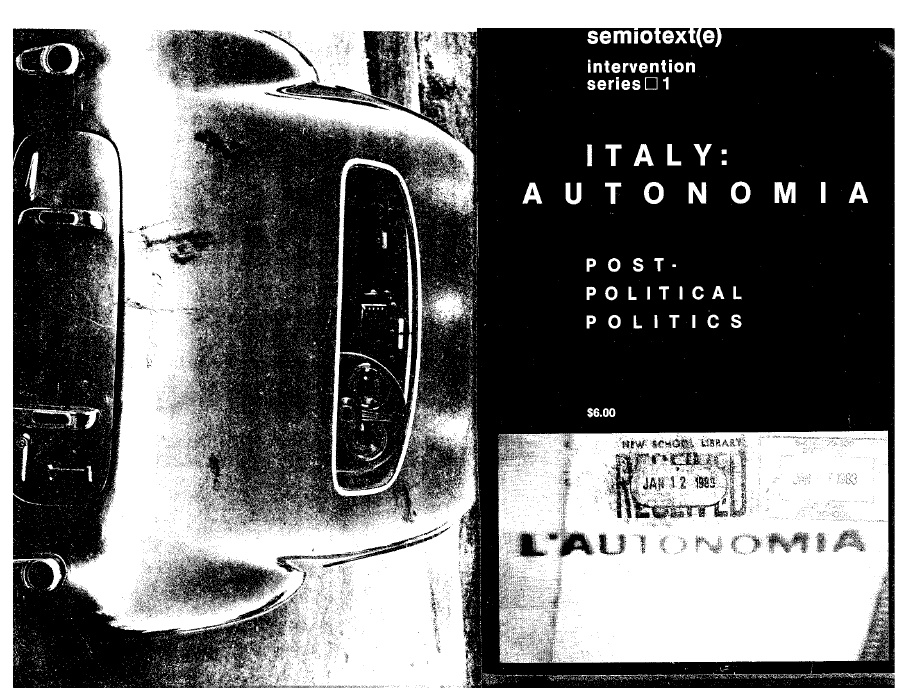Fredy Perlman: The Reproduction of Daily Life (1969-) [EN, CR, PT, FR]
Filed under book | Tags: · alienation, capitalism, economy, everyday, labour, life, production, reproduction, society, value
What sustains Capitalism? Our acceptance of everyday activities. The text offers a clear introduction to basic Marxist concepts like commodity fetishism, and surplus value; it also traces the transformation of human activity into capital. It opens with the observation “that everyday practical activity of tribesmen reproduces, or perpetuates, a tribe.”
Publisher: Black & Red, Detroit, 1969, 24 pages. Reprinted in Anything Can Happen, October 1992, Phoenix Press, PO Box 824 London N1 9DL.
Croatian edition: Reprodukcija svakodnevnog života. Translated by Aleksa Golijanin, 2003. Anti-copyright.
Portuguese edition: A Reprodução do Quotidiano. Translated from Treason Press edition (2004), in February 2009, Edições Versus Capitalismus. Anti-copyright.
French edition: La Reproduction de la Vie Quotidienne. Published by Ravage Éditions, Paris, September 2011. Anti-copyright.
about the author (wikipedia)
publisher
google books
PDF (English, multiple formats)
PDF (Croatian, multiple formats)
PDF (Portuguese, PDF)
PDF (French, multiple formats)
Semiotext(e) 3(3): Autonomia: Post-Political Politics (1980)
Filed under magazine | Tags: · autonomy, italy, politics, proletariat, protest, social movements, society, work

“Semiotext(e)’s legendary magazine issue Italy: Autonomia: Post-Political Politics. Edited by Sylvère Lotringer and Christian Marazzi with the direct participation of the main leaders and theorists of the Autonomist movement (including Antonio Negri, Mario Tronti, Franco Piperno, Oreste Scalzone, Paolo Virno, Sergio Bologna, and Franco Berardi), this volume is the only first-hand document and contemporaneous analysis that exists of the most innovative post-’68 radical movement in the West. The movement itself was broken when Autonomia members were falsely accused of (and prosecuted for) being the intellectual masterminds of the Red Brigades; but even after the end of Autonomia, this magazine remains a crucial testimony of the way this creative, futuristic, neo-anarchistic, postideological, and nonrepresentative political movement of young workers and intellectuals anticipated issues that are now confronting us in the wake of Empire.”
Edited by Sylvère Lotringer and Christian Marazzi
Publisher Semiotext(e), New York
Intervention series, 1 / Foreign Agents series
ISSN 1584350539, 9781584350538
xvi+300 pages
via Stevphen Shukaitis
PDF (8 MB, updated on 2017-6-26)
Comment (0)Christopher Kullenberg: The Quantification of Society: A Study of a Swedish Research Institute and Survey-based Social Science (2012)
Filed under thesis | Tags: · actor-network theory, data, research, social science, society, sweden, welfare state
This thesis is concerned with the contemporary history of quantitative surveys in Sweden. The core epistemic practice of constructing surveys is examined empirically through a case study of the SOM Institute (Samhälle, Opinion, Medier) at University of Gothenburg. The SOM Institute has performed surveys in Sweden since 1986. However, the methodology of quantitative surveys with representative sampling techniques dates back to the 1940s. A central theme in this theses is to follow how these methods and techniques have been made to work under different historical circumstances.
Theoretically, this thesis relies on concepts that are derived from classical Actor-Network Theory (ANT) and then further developed. This conceptual tool-box is then utilized to select moments in the history of surveys that are of special importance for understanding how Swedish society has been quantified.
Special attention is drawn to how the accuracy of surveys is established through mutual reinforcement with previous data. By closely studying how the SOM Institute conducted their first postal surveys in the 1980s, the relation and importance of other, contemporary surveys is emphasized. Moreover, the creation of a state-science interface is described by going back in time to the 1950s and the creation of the first academic surveys. This was also the moment in history when random samples were established. Here, the impact of the creation of the welfare state and the role of science in this political project is discussed and related to the expansion of the social sciences.
To further understand the border between academic science and pollster research, a controversy that took place during the elections of 1985 is studied. The controversy was ignited because pollster data predicted that the conservative party (Moderaterna) would win the elections. However, this turned out to be false. What followed was a debate concerning both the accuracy of different methodologies and the political bias of different surveys. Academic scientists succeeded in creating a position that guaranteed value-free social science, which later would have an impact on the future of social scientific investigations.
The dissertation concludes that the way social phenomena are quantified today, must be understood in a historical context that includes the epistemic practice of social scientists. The creation of large-scale quantitative surveys not only presupposes certain aspects of modern society, it also transforms these societies.
Keywords: Quantification, survey, SOM Institute, social science, epistemic practice, Actor-Network Theory, welfare state, center of calculation.
Dissertation thesis
Department of Philosophy, Linguistics, and Theory of Science, University of Gothenburg
ISBN 978-91-628-8458-1
Kopimi
225 pages

